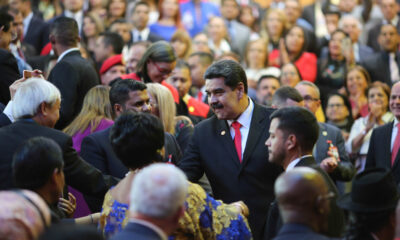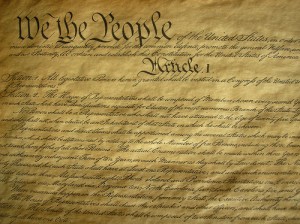Constitution 101
Presidential Electors: who picks them

Presidential electors often confuse those who study the Constitution for the first time. Most people never hear or see the phrase until they vote for them. Then they see ballot instructions: “Presidential Electors: vote for one slate” or words to that effect. Nor do they see the names of Presidential electors. Instead they see the names of Presidential (and Vice-Presidential) candidates. And they might think that Presidential elections are a federal issue, with which no State may interfere. This is wrong. The people choose Presidential electors, and States decide how they choose them.
The Constitution on Presidential electors
The Constitution does not let the people choose Presidents directly. Instead, the people choose Presidential electors, and they choose Presidents.
Article II, Section 1 gives the original procedure. Amendment XII supersedes most of that, and Amendment XX says what happens when January 20 comes and the country does not have a President-elect. Amendment XXIII lets the District of Columbia choose Presidential Electors for itself.
According to Article II, States choose Presidential electors. Furthermore, State legislatures decide how States will choose them. Presidential Electors cannot be Senators, Representatives, or federal officers. The only role that Congress has, is to decide how the District of Columbia will choose its electors. This is consistent with the power of Congress to legislate exclusively over that District (and also over military and other federal campuses and buildings).
Electors meet in their States (Congress may pick the date for this) and vote for one person to be President and the other to be Vice-President. At least one or both men must live in a different State. Each set of electors then makes a list of all candidates for President and Vice-President, and the number of votes for each, and sends these to Washington for counting. Counting takes place on the first day of the new term of Congress. The rules of the House say that any House delegation may object to a given State’s count, but only if a Senator joins them in objecting.
The Presidential candidate having a majority of the votes becomes President, and the Vice-Presidential candidate having a majority of the votes becomes Vice-President. Without such majorities, the House chooses a President from the three leading candidates, and the Senate chooses a Vice-President from the two leading candidates.
Any candidate for President or Vice-President must be a natural born citizen of the United States.
What the Constitution does not say
The Constitution says that each State appoints Presidential electors, and that legislatures direct the way to appoint them. The Constitution does not say:
The clerks of the Senate and House of Representatives shall appoint, in such manner as Congress may direct, numbers of Electors from each State equal to the numbers of Senators and Representatives they have…
[ezadsense midpost]
Nor does the Constitution mention political parties. Ever.
Political parties, starting with the original “Republican Party” of Madison and Jefferson, nominate slates of elector-candidates for the people in each State (and now DC, too) to vote on. No one knows those candidates’ names, except their own States’ divisions of elections. All States, and DC, expect Presidential electors to vote for the candidates of their Party’s choice. So a voter does not see any such instruction as,
Presidential electors; vote for fourteen.
Instead, the ballot instructs them to vote for a slate of electors for a pair of candidates for President and Vice-President. This is why write-in votes for President or Vice-President are useless. No State Division of Elections ever recruits a slate of elector candidates and binds them to vote for a winning set of write-in candidates.
But: if any State decides that a candidate for President or Vice-President does not qualify, then that State has the perfect right not to let its voters vote for Presidential electors and pledge them to vote for such a candidate. The Constitution gives State legislatures full authority to decide that, and Congress may not interfere.
What States could do: uncommitted Presidential electors
Presidential electors do not always vote for the candidate(s) they said they would vote for. This has happened 156 times in our history. The laws of 24 States let those States punish “faithless electors.” That rarely happens.
But the Framers never intended to let political parties have so much power in choosing a President. Originally, Presidential Electors voted for two candidates for President. The candidate having the most votes would be President, and the second-place candidate would be Vice-President. More to the point, each elector listened only to his own conscience in voting for a President.
The Party system changed all that, and Amendment XII made it work. Changing back to a one-election, two-votes system would take another Constitutional amendment.
But State legislatures can do one thing, if they ever had the courage. Suppose enough “independent” or “unaffiliated” candidates won enough State legislative races to capture clear majorities (or super-majorities) in a State’s legislature. (Nebraska would be easier; that legislature has only one house.) Now suppose that this new legislature changes the Presidential election laws radically. Suppose that, under this new law, candidates’ names would no longer appear on ballots. Instead, candidates for Presidential electors would run in their own names, and on their own platforms. Everyone would know who their Presidential electors were, even in the voting booth.
No matter how loudly the Parties complained, they couldn’t do a blessed thing about it. They would have no standing in the federal courts, and could expect no relief, even from the Supreme Court. Because political parties are totally extra-Constitutional creatures. The Constitution does not sanction them at all.
As a side benefit, anyone could run for the post of Presidential elector as a write-in candidate. That would be the best way to break the grip of the Parties.
Why has no State done this? Because almost every State legislator is a member of one major Party or the other. That’s why most States uniformly give their Presidential electors to the Party that gets the most votes. (Maine and Nebraska award two Presidential Electors at-large, and one elector from each Congressional district. Either State could split its Electoral College vote.)
In this election cycle, many persons have said that they will “write in” the candidate of their choice if no Party nominates that person. Obviously the current Party-dominated system for choosing Presidential electors disgusts them. Making Presidential electors seek their posts in their own names would reform that system and restore, somewhat, the system that the Framers first devised.
[amazon_carousel widget_type=”ASINList” width=”500″ height=”250″ title=”” market_place=”US” shuffle_products=”True” show_border=”False” asin=”B00375LOEG, 0451947673, 0800733940, 0062073303, 1595230734, 1936218003, 0981559662, 1935071874, 1932172378, 1936488299″ /]
[ezadsense leadout]
Terry A. Hurlbut has been a student of politics, philosophy, and science for more than 35 years. He is a graduate of Yale College and has served as a physician-level laboratory administrator in a 250-bed community hospital. He also is a serious student of the Bible, is conversant in its two primary original languages, and has followed the creation-science movement closely since 1993.
-

 Civilization3 days ago
Civilization3 days agoTariffs, the Supreme Court, and the Andrew Jackson Gambit
-

 Civilization3 days ago
Civilization3 days agoWhy Europe’s Institutional Status Quo is Now a Security Risk
-

 Civilization4 days ago
Civilization4 days agoDeporting Censorship: US Targets UK Government Ally Over Free Speech
-

 Executive4 days ago
Executive4 days agoWaste of the Day: Wire Fraud, Conflicts of Interest in Connecticut
-

 Civilization4 days ago
Civilization4 days agoEpstein and the destruction of trust
-

 Civilization2 days ago
Civilization2 days agoTrump Lashes Out at Supreme Court as Under ‘Foreign Influence’
-

 Education5 days ago
Education5 days agoWaste of the Day: Throwback Thursday – The Story of Robosquirrel
-

 Civilization1 day ago
Civilization1 day agoMaduro’s Capture: U.S. Foreign Policy in Latin America










Now this, is actually an intriguing concept. Take power away from political parties. That may decrease the extent to which the US tends to polarize. Having a spectrum of candidates, and a less direct voting process could also eliminate the dilemma of choosing between Mr. Ignore the national debt and Mr. I’ve got the backing of the conspiracy theorists.
“In this election cycle, many persons have said that they will “write in” the candidate of their choice if no Party nominates that person”
You do realise that equals a spoiled ballot, right? Which will probably end up doing their cause more harm than good. Especially seeing as those who threaten to do so are 99% sure to be the ultra right-wing.
Still, if you want to go ahead and split the Republican vote even more than you already are, be my guest.
And this still doesn’t explain where you say that states can say who appears on the ballot or not. Obviously they can’t, because what is to stop a really crazy place like Arizona or Tennessee simply saying, “We ain’t havin’ none o’ them dirty Democrats on our ballot, y’all!’?”
In fact, even suggesting that be the case, sounds a lot more like a dictatorship than anything the White House is currently doing.